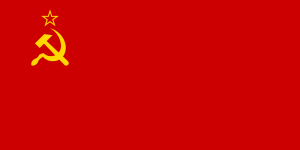Soviet Union at the Olympics facts for kids
Quick facts for kids Soviet Union at theOlympics |
|||||||||
|---|---|---|---|---|---|---|---|---|---|

|
|||||||||
| IOC code | URS | ||||||||
| NOC | Soviet Olympic Committee | ||||||||
| Medals Ranked 2nd |
|
||||||||
| Summer appearances | |||||||||
|
|||||||||
| Winter appearances | |||||||||
|
|||||||||
| Other related appearances | |||||||||
The Union of Soviet Socialist Republics (USSR) first joined the Olympic Games in 1952. They competed in both the Summer and Winter Games 18 times. The Soviet team was very successful.
In six of their nine Summer Olympic Games appearances, they won the most gold medals. They ranked second three times. The USSR became a major competitor to the United States in the Summer Games.
For the Winter Olympic Games, the Soviet team ranked first in gold medals seven times. They were second twice in their nine appearances. Many believe the Soviet Union's success came from the government investing a lot in sports. This helped them achieve political goals on the world stage.
Contents
Joining the Olympic Movement
After the Russian Revolution (1917) and the Russian Civil War (1917–1922), the Soviet Union did not join international sports events. This was due to their political beliefs. However, after World War II (1939–1945), Soviet leaders saw the Olympic Games as a way to promote their ideas of communism.
The Olympic Committee of the USSR was created on April 21, 1951. The IOC officially recognized this new group on May 7, 1951. In the same year, Konstantin Andrianov became an IOC member. This meant the USSR officially became part of the Olympic Movement.
First Olympic Wins
The 1952 Summer Olympics in Helsinki were the first Olympic Games for Soviet athletes. On July 20, 1952, Nina Romashkova made history. She won the first Olympic gold medal for Soviet sport in the women's discus throw. Romashkova's throw of 51.42 meters set a new Olympic record.
The 1956 Winter Olympics in Cortina d'Ampezzo were the first Winter Games for Soviet athletes. There, Lyubov Kozyreva won the first Winter Olympic gold medal for Soviet sport. She competed in the women's cross-country skiing 10 km event.
Hosting and Boycotts
The USSR hosted the 1980 Summer Olympics in Moscow. The United States and many other countries chose not to attend these Games. This was a boycott to protest the Soviet invasion of Afghanistan. In return, the USSR led a boycott of the 1984 Games in Los Angeles.
The Soviet Union officially ended on December 26, 1991. However, The Olympic Committee of the USSR continued until March 12, 1992, when it closed down.
In 1992, seven of the 15 former Soviet republics competed together. They were called the Unified Team. They marched under the Olympic Flag at the Albertville Games. They finished second in the medal count. The Unified Team also competed in the Barcelona Games later that year. There, 12 of the 15 former republics were represented. They finished first in the medal rankings at those Games.
Hosted Games
The Soviet Union hosted the Olympic Games one time.
| Games | Host city | Dates | Nations | Participants | Events |
|---|---|---|---|---|---|
| 1980 Summer Olympics | Moscow, Russian SFSR | 19 July – 3 August | 80 | 5,179 | 203 |
Unsuccessful Bids
The Soviet Union also tried to host the Games another time but was not chosen.
| Games | City | Winner of bid |
|---|---|---|
| 1976 Summer Olympics | Moscow, Russian SFSR | Montreal, Canada |
Olympic Participation Timeline
This table shows how different teams from the region participated over time.
| Date | Team | ||||||||
|---|---|---|---|---|---|---|---|---|---|
| 1900–1912 | |||||||||
| 1920 | |||||||||
| 1924–1936 | as part of |
||||||||
| 1952–1988 | |||||||||
| 1992 | |||||||||
| 1994 | |||||||||
| 1996–2016 | |||||||||
| 2018 | |||||||||
| 2020–2022 | |||||||||
| 2024– | |||||||||
Olympic Medal Tables
- *A purple border means the Games were held in the home country.
Medals at Summer Games
|
Medals at Winter Games
|
|||||||||||||||||||||||||||||||||||||||||||||||||||||||||||||||||||||||||||||||||||||||||||||||||||||||||||||||||||||||||||||||||||||||||||||||||||||||||||||||||
Medals by Summer SportLeading in that sport
|
Medals by Winter Sport
|
See also
 In Spanish: Unión Soviética en los Juegos Olímpicos para niños
In Spanish: Unión Soviética en los Juegos Olímpicos para niños
- List of flag bearers for the Soviet Union at the Olympics
- Category:Olympic competitors for the Soviet Union
- Soviet Union at the Paralympics
 | Valerie Thomas |
 | Frederick McKinley Jones |
 | George Edward Alcorn Jr. |
 | Thomas Mensah |

